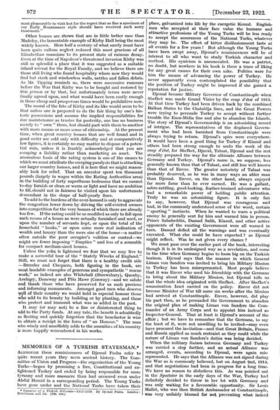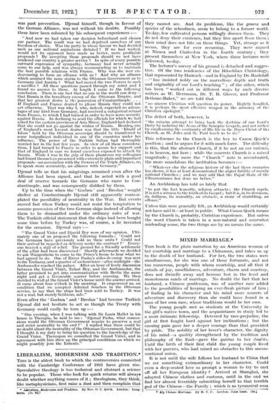- MEMORIES OF A TURKISH STATESMAN.* ALTHOUGH these reminiscences of
Djemal Pasha refer to quite recent years they seem ancient history. The Com- mittee of Union and Progress—the organization of the Young Turks—began by promising a free, Constitutional and en- lightened Turkey and ended by being responsible for more tyranny and more massacre than had occurred even under Abdul Harald in a corresponding period. The Young Turks have gone under and the National Ttirks have taken their • Memories' of a Turkish 612farman-1913-191.9. by Djshial Pasha. London: Ilutchinson and Co. nee. neLl place, galvanized into life by the energetic Kemal. English- men who accepted at their face value the humane and
attractive professions of the Young Turks will be less ready
to accept the assurances of the National. Turks, whatever they may be. The effect of bitter disillusionment lasts at
all events for a few years I But although the Young Turks have been swept away, Djemal's reminiscences will be of interest to all who want to study Turkish character and method. His cynicism is unconcealed. He was a patriot, no doubt, but nowhere in his book is there a trace of liking for any great causes for their own sake. Politics were for him the means of advancing the power of Turkey. He never apparently even contemplated the possibility that the position of Turkey might be improved if she gained a reputation for justice.
Djemal became Military Governor of Constantinople when Shefket was made Grand Vizier by the coup d'etat of 1913. At that time Turkey had been driven back by the combined Balkan States to the Chataldja lines, and the Great Powers were trying to persuade Turkey to accept without further trouble the Enos-Midia line and also to abandon the Islands. The story of Djemal's Governorship is an astonishing record of intrigue. The representatives of the displaced Govern- ment who had been banished from Constantinople were always trying to return. Djemal's spies were everywhere. It would have been a good thing for Turkey if Kiamil and others had been strong enough to undo the work of the coup d'etat, for Shefket, Djavid, Talaat, Djemal and the rest steadily prepared the way for the ultimate Alliance between Germany and Turkey. Djemal's name is, we suppose, less generally known than that of Talaat, and still less well known than that of Enver. The greater notoriety of Talaat was probably deserved, as he was in many ways an abler man than Djemal. Enver, on the other hand, always enjoyed far more fame than he ever earned. He was a gallant, sabre-rattling, good-looking, feather-brained adventurer who had a remarkable power of holding public attention. Truly he was an astonishing figure. It is only fair to say, however, that Djemal was courageous and had, in the commonly understood sense of the word, certain " sporting " instincts. When he wanted to warn a political enemy he generally sent for him and warned him in person. Prince Sabaheddin, Damad Salih, Kiamil, and other active opponents of the existing Government were all warned in turn. Damad defied all the warnings and was eventually executed. What else could he have expected ? as Djcmal might reflect. Was he not given every chance ?
We must pass over the earlier part of the book, interesting though it is in its undesigned way as a revelation, and come to the time when Germany begins to loom big on the Turkish horizon. Djemal says that the manner in which General Liman von Sanders was invited to bring his Military Mission to Turkey has been misrepresented. Most people believe that it was Enver who used his friendship with the Germans to bring, about the Military Mission, but Djemal tells us that the whole idea originated with Shefket. After Shefket's assassination Izzet carried on the policy. Enver did not become Minister of War till some six weeks after the Mission had arrived at Constantinople. Enver, however, did play his part then, as he persuaded the Government to abandon the original plan of making Liman von Sanders the Com- mander of an Army Corps and to appoint him instead as Inspector-General. That at least is Djemal's account of the affair ; but we have to remember that the Germans, to say the least of it, were not unwilling to be invited—may even have procured the invitation—and that Great Britain, France and Russia applied as much restraint as they could while the nature of Liman von Sanders's duties was being decided.
When the military liaison between Germany and Turkey was carried a step further, and an actual Alliance was arranged, events, according to Djemal, were again mis- represented. He says that the Alliance was not signed during the War as is commonly believed, but on August 2nd, 1914, and that negotiations had been in progress for a long time. We have no reason to disbelieve this. As was pointed out in the Spectator in the early days of the War, Turkey had definitely decided to throw in her lot with Germany and was only waiting for a favourable opportunity. Sir Louis Mallet, who was then British Ambassador at Constantinople, was very unfairly blamed for not preventing what indeed
was past prevention. Djemal himself, though in favour of the German Alliance, was not without his doubts. Possibly these have been coloured by his subsequent experiences :-
" And now we had taken our decision beforehand and chosen our partner. The result was we had deprived ourselves of our freedom of choice. Was the party in whose favour we had decided such as our national aspirations dictated ? If we had waited, would not its opponent have made us better, more profitable proposals ? By accepting those proposals should we not have rendered our country a greater service ? In spite of every possible outward expression of sympathy, Germany had never actually come to our help, and was always recommending us to maintain the best possible relations with France. Why was she now en- deavouring to form an alliance with us ? And why an alliance which assigned the same status to the Ottoman Government as to Germany and Austria ? What had moved the two Powers to such a sacrifice ? All these questions passed through my mind and I found no answer to them. At length I came to the following conclusion. There is one fact that no one in the world can deny—. that Russia is the hereditary enemy of' the Ottoman Empire, and that her greatest desire is the possession of Constantinople. . . . If England and France desired to please Russia they could not act otherwise. That was why I, who, indeed, expected no advan- tages of any kind from Germany, had received a categorical refusal from France, to which I had turned in order to have some security against Russia. In declining to send the officials for which we had asked for the eastern provinces of Asia Minor, England had declared that she could not go against the wishes of Russia. Besides,,one of England's most fervent desires was that the title Khalif of Islam ' held by the Ottoman sovereign should be transferred to some insignificant individual in one of the countries under her influence. The power of the Turkish Sultan had thoroughly worried her in the last few years. In view of all these considera- tions, I had turned to France in order to secure her support and that of England in case we found ourselves exposed to attack by Russia. While I was in the grip of these phantoms my colleagues had found themselves presented with extremely plain and important proposals—an association with the Powers of the Triple Alliance, or, to speak more accurately, an alliance with Germany."
Djemal tells us that his misgivings remained even after the Alliance had been signed, and that he acted with a good deal of reserve towards the Germans who came to Con- stantinople, and was consequently disliked by them.
Up to the time when the Goeben ' and ' Breslau ' sought shelter at Constantinople Djemal still apparently contem- plated the possibility of neutrality in the War. But events moved fast when Turkey could not resist the temptation to assume possession of the two German ships instead of allowing them to be dismantled under the ordinary rules of war. The Turkish official statement that the ships had been bought some time before by Turkey was, of course, a lie invented for the occasion. Djemal says :-
" The Grand Vizier and Djavid Bey were of my opinion. Ulti- mately one of us proposed the following formula : Could not the Germans have previously sold us these units Could not their arrival be regarded as delivery under the contract ? ' Every- one heaved a sigh of relief. The ground for a friendly settlement of the affair had been discovered ! Shortly afterwards we decided to ask Wangenheim to come to the Prince's house to hear what we had agreed to do. One of Envcr Pasha's aides-de-camp was sent to the Embassy, and a quarter of an hour later—after midnight—the Ambassador reached the palace. After an hour of lively discussion between the Grand Vizier, Talaat Bey, and the Ambassador, the latter promised to get into communication with Berlin the same night and get a favourable answer before morning. We then decided to wait at the Grand Vizier's house until the answer arrived. It came about four o'clock in the morning. It empowered us, on condition that we accepted Admiral Souchon in the Ottoman service, to say that the ships had been sold to Turkey. It was not a real, but merely fictitious, sale."
Even after the Goeben ' and ' Breslau ' had become Turkish Djemal did not hesitate to act as though the Treaty with Germany could easily be torn up :- " One evening, when I was talking with Sir Louis Mallet in his house in Therapia, he said to me : Djemal Pasha, what conces- sions would the Ottoman Government require to preserve a real and strict neutrality to the end ? ' I replied that there could be no doubt about the neutrality of the Ottoman Government, but that I -thought it my duty to bring his question to the knowledge of the Grand Vizier. Thereupon we consulted the Grand Vizier, and in agreement with him drew up the principal conditions on which we might possibly join the Entente."











































 Previous page
Previous page